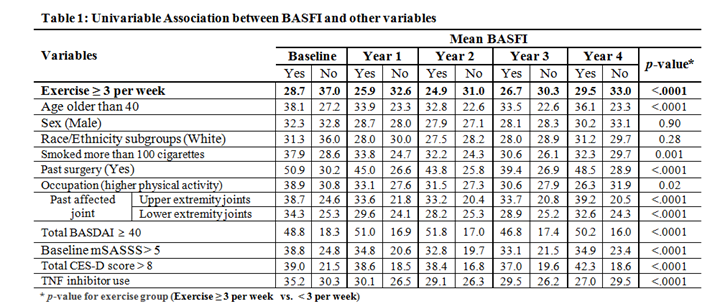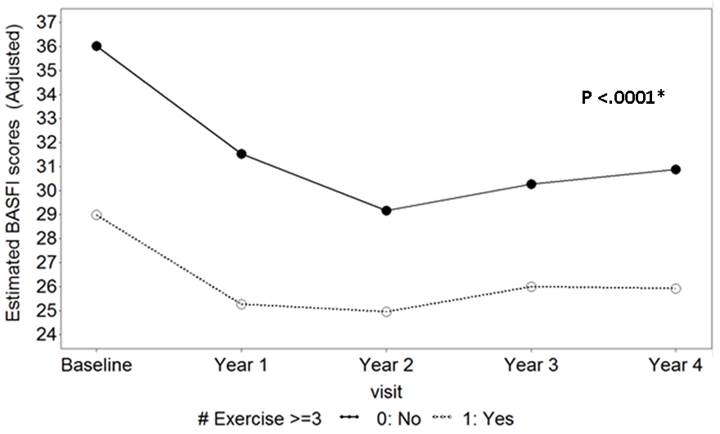Session Information
Session Type: Abstract Submissions (ACR)
Background/Purpose: Exercise and physical therapy are the cornerstones of non-pharmacologic therapy in Ankylosing Spondylitis. The long-term association of exercise on function has not been evaluated. The purpose of this study was to assess the role of regular exercise in longitudinal functional outcomes in AS patients.
Methods: This is a prospective cohort of 611 AS patients, meeting the modified New York criteria followed up to 4 years. We collected demographic, clinical and self-reported outcomes every 6 months. Exercise data were also collected every visit, including how many days per week patients exercised. Regular exercise was defined as greater than or equal to 3 times per week. Functional outcomes were assessed by the Bath Ankylosing Spondylitis Functional Index (BASFI). Using mixed models, we assessed univariable associations between independent variables and functional outcome (BASFI) that accounted for correlation of repeated measures over time. Potential confounding and effect modifications were examined and addressed while developing a final longitudinal multivariable model.
Results: There were 611 patients included with a mean age of 41.1 years (SD= 13.6). The cohort comprised 71% males and 76% of patients were white. Mean Disease duration was 17.6 years (SD=13.5). Table 1 shows the univariable associations between BASFI and each independent variable from the longitudinal models. After adjusting for potential confounders, including age, gender, education level, employment status, race, past AS-related joint surgery, occupation, smoking, TNF inhibitor use, disease activity by the Bath Ankylosing Spondylitis Activity Index (BASDAI), disease damage by the baseline modified Stoke Ankylosing Spondylitis Spine Score (mSASSS), depression by the Center for Epidemiologic Studies Depression Scale (CES-D), and past joint involvement, the effect of regular exercise on BASFI remained significant (p <0.0001) over time. Figure 1 shows the adjusted means of BASFI by exercise group over time.
Conclusion: AS patients that exercise regularly (≥ 3 times per week) have significantly better function than those that do not.
Figure 1. Longitudinal Association of Regular Exercise with Function from the multivariable longitudinal model
Disclosure:
L. S. Gensler,
None;
J. D. Reveille,
None;
M. Lee,
None;
M. Rahbar,
None;
M. Ardjomand-Hessabi,
None;
M. A. Brown,
None;
M. H. Weisman,
None;
M. M. Ward,
None.
« Back to 2013 ACR/ARHP Annual Meeting
ACR Meeting Abstracts - https://acrabstracts.org/abstract/regular-exercise-is-associated-with-better-functional-outcomes-in-ankylosing-spondylitis/


